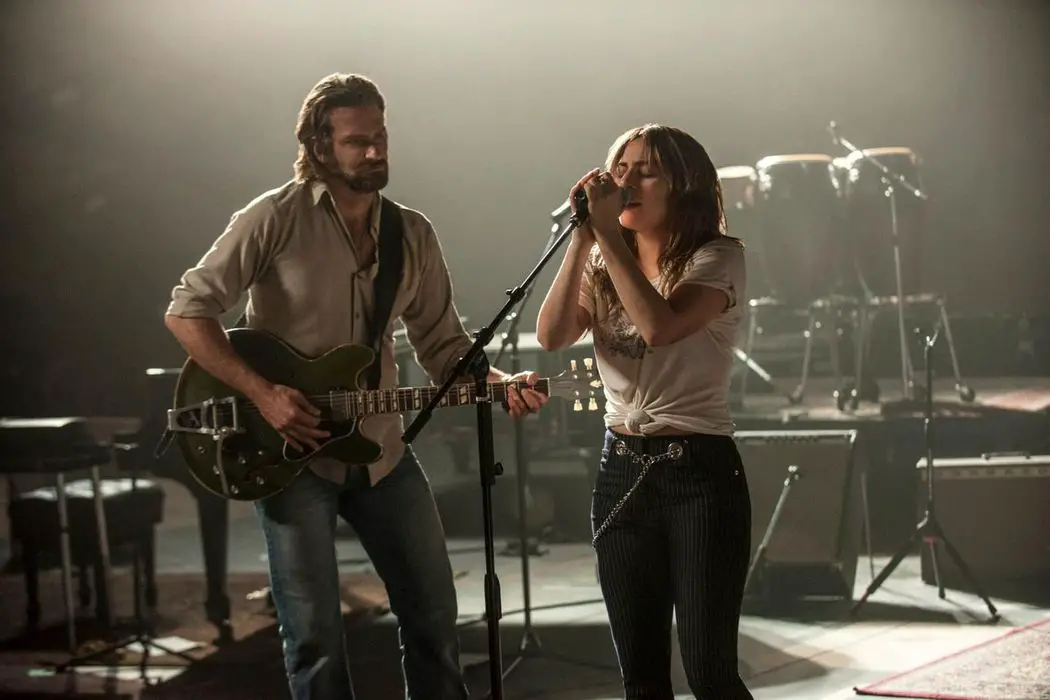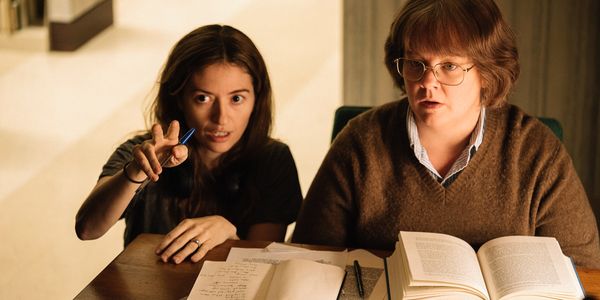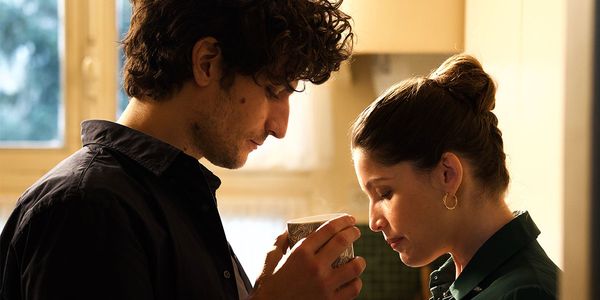Toronto International Film Festival 2018 Report Part 4: I’m Off The Deep End, Watch As I Dive In

Tomas is a chronic cineaste who studied English literature in…
This report corresponds to my fourth day at Toronto International Film Festival (Sunday, September 9). It is also the last one to be posted during the festival proper. But fear not, my loyal readers! I will continue providing reviews after the festival ends, when the popcorn kernels are swept up, the velvet rope is put away, and the volunteers fold up their orange shirts for another year. As the sole representative of Film Inquiry, I see it as my duty to see as much as I can and give you the full scoop, so even if my last report is filed at the end of the month (not that it will be), I know you’ll still be reading.
So, without further ado, here are four more reviews for your perusal:
Can You Ever Forgive Me? (Marielle Heller)

Scheduling a film festival can be a messy business, because you inevitably have to miss out on some great films. No one can see everything. And so it was that I nearly skipped out on Can You Ever Forgive Me? until a last-minute adjustment brought it back into an open slot. This turned out to be the right decision, because I ended up loving the film quite a bit. I had my initial doubts, as high-profile biopics featuring A-list actors don’t always turn out well. They’re either too glossy and artificial, or give too incomplete of a picture of their subjects. Marielle Heller’s sophomore feature has neither of those issues. Even with a big name like Melissa McCarthy anchoring the proceedings, Heller is careful to imbue her take on Lee Israel’s story with an aching gravitas that befits her subject.
Even dramatizing Israel’s story works in Heller’s favor, because outside of literary circles, very few people know who she was. A biographer who began forging literary correspondence from famous writers to make ends meet, Israel was also socially isolated and prickly, preferring her cat over human companionship. A character like this doesn’t exactly scream for the broad extroversion of Melissa McCarthy, and yet the comedienne does beautifully as she plays against type, finding an inordinate amount of pathos and empathy in Israel that you wouldn’t expect. Instead of dismissing her as a criminal oddball, McCarthy and Heller go to great pains to portray her as a talented woman using the wrong outlet to express herself; in doing so, they humanize her. They bequeath her a dignity that is never lost on us, because they identify with the dilemma of growing old and still having self-doubts and a crippling fear of not having accomplished enough. They get Israel in a way that I don’t think another actor-director pairing would have done.
There’s also nothing more delightful than seeing the reliably wonderful character actor Richard E. Grant lend his mellifluous voice and cheeky mien to the role of Israel’s gay friend and co-conspirator Jack Hock. It’s a role that allows Grant to showcase some of his finest work to date, gleefully finding a camp sensibility and impeccable comic timing in Jack’s animated way of conversing. What’s more, it’s just refreshing to see an LGBTQ friendship like this in a mainstream film, especially between two older people whose prime has passed them by. Their chemistry is so good that it’s impossible not to tear up during their poignant final scene together.
The bulk of the film’s success, however, can be traced to Heller. Her direction is lyrical, gently following Israel’s movements like a swallow gliding down a branch, aware not of her subject’s defects, but of her tender loneliness and lack of acknowledgment by the wider world. She also supplements this with a soundtrack of jazz standards, whose lyrics all speak to the melancholy evoked when you have no one left to turn to but yourself. Not only does it make the film outwardly classy, but it also elevates the mood so that you are able to connect with the material on a deeper level. After all, what better way to connect a diverse audience than through the power of song?
Oh yes, reader, my heart positively swooned for this beautiful film.
Fausto (Andrea Bussmann)

Filmed with a Sony a7s camera on a beach in the Mexican town of Oaxaca, Andrea Bussmann’s Fausto is a beguiling and often bewildering mélange of ideas about the anthropocentric world and its constant tensions with the natural order. It is framed by the Faustian myth, with her sources culled from the likes of Goethe and Gertrude Stein; frequently Bussmann films a storyteller relating a tale of piracy and devilish deals that corresponds to the theme, while her unseen narrator speaks with a Faustian echo himself, observing his subjects with a prying mind and serpentine tongue. He imposes his subjectivity on everything and everyone, and my assumption is that, through him, Bussmann is challenging us to do the same, knowing that we cannot.
The beach setting is given a transitory aura, often filmed in low-light conditions so that we must struggle to interpret the specks of light that poke through the blackness. It feels purgatorial in its deliberate liminality, forcing those in its confines to stay put and find shadows and unknown creatures terrorizing them. In a way, that is the film itself, stalking our preconceptions and making us reinterpret what once seemed knowable, lest we wish to be cursed by a demonic presence far off in the shadows. “As I watch the bright stars shining, I think a thought of the clef of the universes and of the future,” wrote Walt Whitman in his poem “On the Beach at Night Alone.” That might as well be the film’s tagline, because, as the poem goes, “A vast similitude interlocks all,” and Bussmann goes on to chronicle her own take on that very similitude.
That take ends up focusing predominantly on the animal kingdom, and how it is important that our modes of perception include those that we usually consider inferior. One of Bussmann’s arguments is that there is a kind of telepathy between animals that cannot be dismissed out of hand, and so we must consider the animal if we are to consider our own futures on this planet. The way she binds up the argument is esoteric and not immediately evident on a first viewing, so truthfully I’d need one more stab at this to fully tease out the map of her ideas. What I immediately discerned, however, was a reverence for the wonders that abound on this planet of ours. Bussmann’s curiosity and desire to transform the everyday into fable-like reverie creates a cinema that transfixes as much as it is liable to transgress, and for that I’m happy to have partaken in viewing her new work.
A Faithful Man (Louis Garrel)

I am not sure why a film like A Faithful Man needs to exist. I couldn’t fathom a reason while watching it, and I can’t fathom one now. It rehashes so many well-trodden clichés about French romantic comedies and does very little with them that is interesting. It aims for a droll archness that wears out its welcome almost instantly. The performances range from stilted to overexpressive. It’s also rather dull, as none of the characters are written with much depth, their personalities (or lack of them) reaching only the surface of the actors’ bodies. I am tempted to wonder if the film would’ve worked in short form, but then I think about how undemanding it is, and realize that maybe it wouldn’t be much better.
Louis Garrel directs and stars as Abel, a brooding, ebony-haired gent whose pregnant girlfriend Marianne (Laetitia Casta) leaves him for another man, believing the baby to be his. Fast forward about seven years later, and Marianne’s husband is dead from a heart attack. Abel attends the funeral and successfully reconnects with his old flame, unaware that her son is more than a little weird, and that the dead man’s sister, Eve (Lily-Rose Depp), has been obsessed with Abel for years, and now wants to steal him away for good. Throw in idle talk of Marianne being a murderer, and a convenient switcheroo in the triangle late in the film, and you get something that is as innocuous as it is inconsequential.
The main reason A Faithful Man is so disposable is that it’s yet another tale of deceitful or untrustworthy women circling a less culpable man, a formula that no longer gels with contemporary sexual politics. Both Marianne and Eve are presented to us suspiciously, with their actions and motives never entirely knowable, and thus more likely to be perceived as a little more than dangerous. Abel, meanwhile, is a bit of a fool in his own right, but much more of an open book. Garrel projects no sense of danger on him. He’s gullible and a romantic, and the perfect foil for women hoping to take advantage of him. It’s clear we’re mostly supposed to be on his side, even if he doesn’t learn much from his mistakes. The main thing is: compared to the women in his life, he is relatively normal, and being normal counts for a lot in a topsy-turvy world.
Garrel adds a few New Wave touches to his work to make it slightly less maddening, including some stream-of-consciousness voiceover and playful sidesteps (such as one scene in which Eve misremembers the age in which she went inside Abel’s unlocked car). However, a couple tips of the hat to cinematic history do not guarantee your film will be better for it, as is the case here. Garrel’s few tributes to the past aren’t enough to give A Faithful Man a good enough reason to exist in the present. Nor does his competent, but largely unremarkable, direction prove that he should quit acting any time soon.
A Star is Born (Bradley Cooper)

You know the memes. Jigglypuff singing the chorus to “Shallow.” Lady Gaga’s irresistible smirk when Bradley Cooper rolls down his window and asks if he can take another look at her. Seriously, A Star is Born seems like it will be more famous before its wide release than after it, judging by how quickly it has accrued capital on the pop culture marketplace. And why shouldn’t it? People are excited for this film, and they have every right to be, because it’s going to be worth the wait. I’ve seen it with my own eyes and can attest that, yes, it’s really very, very good. Oftentimes excellent. The kind of film that no one is going to stop talking about for months, because very few people will have anything bad to say about it.
Is a plot summary even necessary at this point? If you’ve seen the previous iterations of the story, you’ll know that it’s about a man discovering his new muse, a powerhouse singer with untapped potential. In this version, the man is Jackson Maine (Bradley Cooper), a grizzled country singer with a drinking problem, who nevertheless treats his ladies in a gentlemanly way. When he stumbles into a drag bar one night, he sees Ally (Lady Gaga) doing her best Édith Piaf impression, and almost instantly the sparks fly. He takes her under his wing and teases out the inner songwriter that has been waiting to soar, and the rest is history. There are ups, there are downs, and there is a lot of love.
The way in which Cooper develops the burgeoning stages of Jackson and Ally’s relationship is, in a word, sublime. The shy way in which they converse when they first meet, and the repartee they share as they get closer to each other, pulls us into their special connection from the start. It all comes to a head during a stunning scene in a convenience store parking lot, that ends with Ally’s injured hand taped up with frozen peas and Jackson closely watching her as she begins singing an impromptu number that later will become the now-famous “Shallow.”
Not only is the romantic nature of the scene apparent from their tender expressions, but the way in which they listen to each other is so beautifully conveyed. They lean forward to hear each other out. They are attentive to their bruised pasts without trying to one-up the other. Both Gaga and Cooper exude a comfort in their mutual exchange that feels less like acting and more like honesty. They are honest with us, and so we trust them to follow through—which they do, brilliantly.
The one misstep the film makes is in the third act, when our attentions are forcibly turned on Jackson and his worsening alcoholism, while Ally is basically sidelined once her pop career is cemented. The meta commentary on Lady Gaga’s own career is a fun little wink to us, but for a film that places almost all of its hopes on Ally’s rise to stardom, it’s strange to see her so quickly shoved aside in Jackson’s favor once that stardom is achieved. It’s not that Jackson is less interesting, for Cooper’s performance is the best he’s ever given (they can engrave that Oscar now, that’s how great he is). His arc’s resolution is also key to knocking the wind out of you by the time the final musical number rolls around. It’s just not as thrilling as seeing Gaga go from self-conscious duckling to unstoppable swan.
The last half also has no scenes that rival those first ones, when Jackson and Ally first lock eyes on one another. There is a sense of diminishing returns, which makes the film a little more flawed than I was expecting after the first burst of euphoria out of Venice. However, almost a week after seeing it, I think about its magic often. I’m already excited to see it for a second time. That should be enough to convince you that it’s going to be The Next Big Thing.
P.S. Sam Elliott is incredible in this, despite his limited screentime. Just thought I’d give him a shoutout, because I loved his performance as much as the lead ones.
Toronto International Film Festival: Next Time
Barry Jenkins brings us his follow-up to Moonlight, and you can bet you’ll be hearing a lot about it in the coming months. Plus, I offer up takes on some deep cuts about textiles, Scottish songbirds, and a tense grandmother-granddaughter relationship.
Is A Star is Born your most anticipated film of the year? If so, why? Let us know in the comments below!
The Toronto International Film Festival runs from September 6th to the 16th.
Does content like this matter to you?
Become a Member and support film journalism. Unlock access to all of Film Inquiry`s great articles. Join a community of like-minded readers who are passionate about cinema - get access to our private members Network, give back to independent filmmakers, and more.
Tomas is a chronic cineaste who studied English literature in university (in both the undergraduate and graduate levels), and hopes to pursue a career in writing. His passion for film began in earnest at the beginning of the 2010s, and since then he's been reveling at the vast horizons of the cinematic landscape like a kid at the proverbial candy store.













